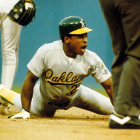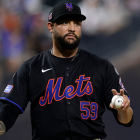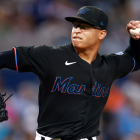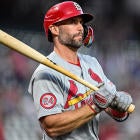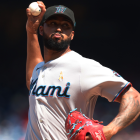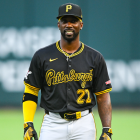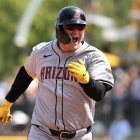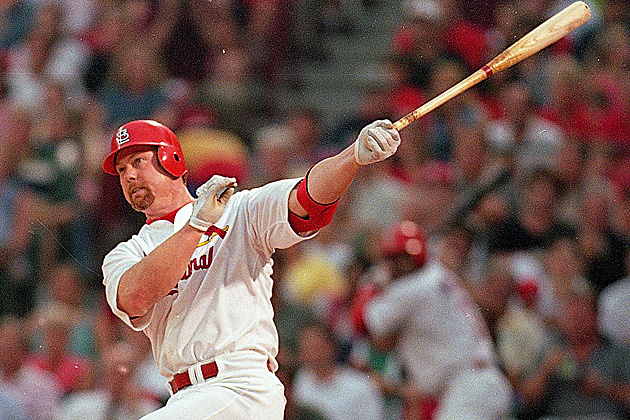 |
| "Big Mac" as a Hall of Famer? Steroids are the only real argument against him. (Getty Images) |
We continue our countdown of the 37 names on the BBWAA Hall of Fame ballot with a man who once appeared to be a shoe-in, but is on his seventh ballot.
First, let's remind you of parameters we've included before -- these rankings are based on an average of rankings set forth by the three Eye on Baseball bloggers -- Matt Snyder, Dayn Perry and myself. While the official BBWAA ballot is limited to 10 players per ballot, we did not give ourselves that restriction.
And with that said, we get to No. 11 on our list, a once-controversial name, and now almost an afterthought in our discussion of the Hall of Fame debate.
11. Mark McGwire; 1B; Athletics, Cardinals; 1986-2001
Year on ballot: 7th (got 19.5% of the vote last year)
Career stats: .263/.394/.588, 583 HR, 1,414 RBI, 1,167 R, 252 2B
bWAR, rank among candidates: 58.7, 12th
JAWS, rank among candidates: 49.4, 12th
| Baseball Hall of Fame |
| Related coverage |
|
In January, Mark McGwire will be denied entry into the Hall of Fame for the seventh time. While candidacies of Barry Bonds, Roger Clemens and Sammy Sosa have been held up as a referendum on the so-called steroid era, we've had our answer for several years now. Those three won't get the 75 percent needed for enshrinement in the Hall of Fame. We know that, in part, because Mark McGwire has never received more than 23.7 percent of the vote.
Let's start with steroids. Yes, McGwire used them. In January of 2010 -- after he received his highest vote total -- McGwire was named the Cardinals hitting coach and he admitted he used performance-enhancing drugs (including steroids and human growth hormone) off and on for nearly a decade. The next season, his vote total dipped to 19.8 percent, his lowest vote total to date. Last year, he went down again, to 19.5 percent.
Just last month, McGwire himself, said he wouldn't vote for himself for the Hall of Fame. He's also said that he doesn't expect to ever get into the Hall of Fame.
Since the steroid debate is stale -- and most people are firm in their stances -- there are also baseball cases to be made.
The vote for McGwire is pretty easy to make. When McGwire retired following the 2001 season, his 583 home runs ranked fifth on the all-time list. Since then he's been bumped to 10th, with two players passing him that have their own steroid suspicions (Bonds and Sosa) and another who has admitted to using performance-enhancing drugs (Alex Rodriguez).
Some critics call McGwire a one-trick pony, which neglects two basic details -- 1. that's a pretty good (and important) trick, and 2. it's not accurate. In addition to hitting home runs -- something he did very well -- McGwire also excelled at another very important skill, one some may argue is the most important -- not making outs. For his career, McGwire posted a .394 on-base percentage, the 81st best mark in baseball history. He twice led the league in that category, putting up a .467 OBP in 1996 and a .470 OBP in his 70-homer year of 1998.
It should be safe to assume McGwire's slugging percentage was superb -- and you'd be right. His .588 slugging percentage is eighth all-time, leading his league in the category four times and finishing second in two more seasons, as well as two more top-10 finishes. He twice led the league in OPS and his .982 career OPS is 10th all-time, and his career OPS+ of 163 is 13th all-time. He led his league in OPS+ four times, including a 216 OPS+ in 1998, tied with Ted Williams' 1942 as the 21st best single-season mark of all time (and ninth among players not named Bonds or Ruth).
Something that should also be noted, that for all of McGwire's power production, only twice did he finish in the top 10 in the league in strikeouts, in 1998 and 1999.
McGwire's career numbers are impressive, but injuries did take their toll and kept him from possibly passing Hank Aaron and Babe Ruth on the all-time home run list. After hitting 202 home runs from his debut late in the 1986 season through 1992, he played in just 178 games from 1993-95, including 27 in 1993 and 47 in the strike-shortened 1994. Injuries also cut his career short -- after hitting 135 home runs in 1998 and 1999, he played just two more season, and didn't appear in 100 games in either.
We previously noted that McGwire had a career on-base percentage of .394 and twice led the league in OBP, it should be noted that those two years -- 1996 and 1998 -- were the only two times he was in the top 5 in the category and had just two more seasons in the top 10.
For all his exploits, he recorded a bWAR of 5.0 or better just six times in his career. Not including his 18-game stint in 1986, McGwire had five seasons with bWAR at either 2.0 or lower, including 1991 when he put up 1.3 WAR in 154 games.
While McGwire did set the single-season home run record in 1998, he did not win the National League's Most Valuable Player Award that season -- and he never won an MVP. According to WAR, he never should have won, either. McGwire finished his career with a bWAR of 58.7, and only once was he in the top five in bWAR (a 7.2 bWAR in 1998) and two more times he finished 10th (1990, 1992). His career bWAR is 15th all-time among first basemen, lower than the average first baseman in the Hall of Fame, and behind Jeff Bagwell (76.7) and Rafael Palmeiro (66.1).
We've also discussed JAWS at length in this series. The short version is JAWS takes the top seven seasons from a player and uses a WAR system to rank a players' best seasons among others at the same position. McGwire's 49.4 WAR is below the average of the 18 first basemen in the Hall of Fame (51.5) and also less than Bagwell (61.7) and Palmeiro (51.3). He also trails active first basemen Albert Pujols (74.2), Jim Thome (53.5) and Todd Helton (51.7), as well as Frank Thomas (56.7), who is not yet Hall eligible.
For many, the choice is easy. But like many of his contemporaries, there is a more complex case to be made -- for or against -- for McGwire.
Would we vote for him? Snyder: Yes (8); Rosecrans: Yes (11); Perry: Yes (12)
For more baseball news, rumors and analysis, follow @EyeOnBaseball on Twitter, subscribe to the RSS feed and "like" us on Facebook.







